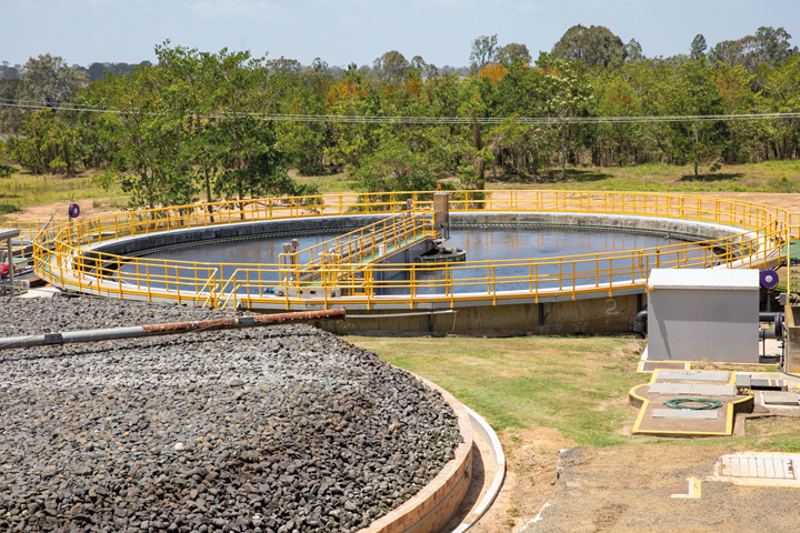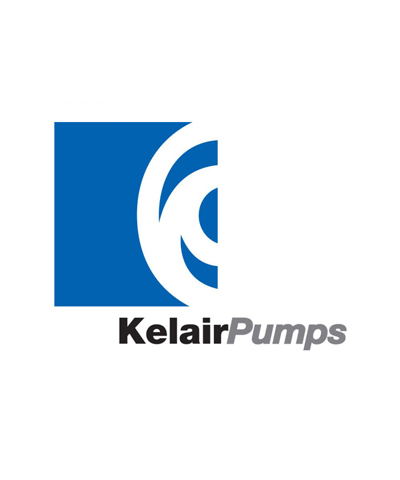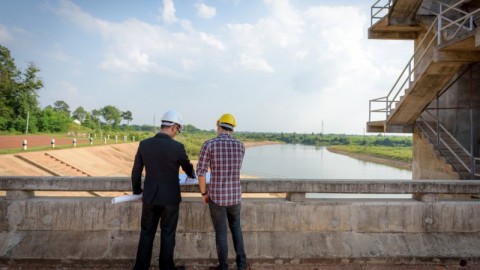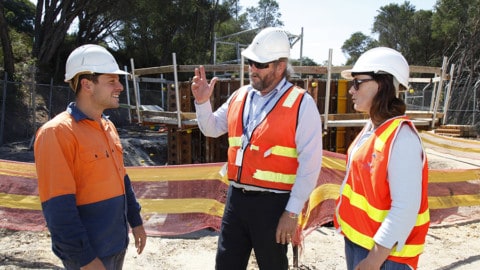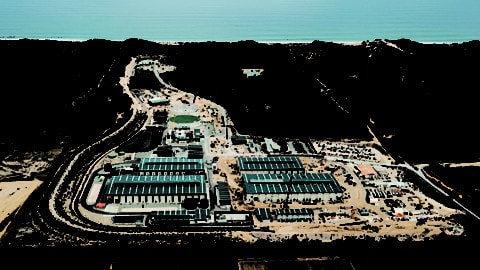By Kody Cook, Journalist, Pump Industry Magazine
The Aubinville Sewage Treatment Plant (STP) is the only STP in Maryborough, Queensland, making it a vital piece of wastewater infrastructure for the city. As the plant reached its 80th year of operation, Fraser Coast Regional Council undertook an upgrade to modernise the equipment and facilities to prepare the plant to meet the future demands of a growing community.
The plant serves more than 23,000 residents as well as commercial and industrial properties connected to the sewage collection system in Maryborough, with the plant receiving 1,925ML of raw sewage for treatment in the 2022–23 financial year. The works for the $26 million revamping were finally completed in October 2023 after four years of construction.
Key upgrades at the Aubinville STP include:
• New boiler, digester jet mixing system, dewatering unit and chemical dosing system
• New control room overseeing the entire plant with a new laboratory for testing
• Complete refurbishment of the two secondary settling tanks, including the installation of a new sludge pumping station
• Upgrade of ladders, stairs, handrails, platforms and walkways to current standards
• New fibre reinforced plastic (FRP) raw sewage pumping station fabricated by Aquatec with four Xylem submersible pumps
• New inlet works to improve screenings and remove materials and grit
• New trade waste/septic tanker receival system with a state-of-the-art biological odour treatment unit
• New liquid waste receival system
Fraser Coast Regional Council’s Executive Manager of Engineering and Technical Services, Trevor Dean, said the Aubinville STP Upgrade was predominantly targeted as asset refurbishment, renewal, and improvements to the operability of the plant.
“The works were identified as required to overcome a number of operational deficiencies in the plant,” Mr Dean said. “These deficiencies were compromising consistency and reliability of effluent quality. The plant also had limited resilience and lacked redundancy throughout the mechanical components.
“As such, the upgrade hasn’t created an overall increase in capacity although provision has been made in the upgrade project to facilitate future capacity increases. Some of the longer age assets in certain areas of the upgrade have been constructed to a higher capacity.”
Ensuring uninterrupted service
The Aubinville plant is the sole STP for the City of Maryborough. As such, it needs to be able to continually treat all the raw sewage collected from the city. The modern equipment installed on site were chosen to set up the plant to meet future demands and ensure uninterrupted service.
A new return activated sludge (RAS) pumping station utilising rotary lobe pumps in a duty/standby/duty arrangements (common standby) was installed to produce a higher quality effluent from the treated sludge. Supporting the mechanical dewatering process, a new screw press, liquid poly batching and chemical dosing system were installed as well, assisting in the treatment of anaerobically digested biosolids.
“From the outset, all the proposed works needed to be designed and delivered in such a way that the continual operability of the plant was foremost in everyone’s mind and that any works involving interruptions to existing services were planned and coordinated to ensure continuity of service,” Mr Dean said.
Mr Dean said that this included ensuring that there were contingency plans in place that could be implemented when appropriate. “The Project Management Team worked hand in glove with the STP Operator and assistants to ensure that the operational area was aware of what works were being undertaken and the impact of any project works.
“The Operators and Council’s Mechanical and Electrical Maintenance staff were key stakeholders consulted prior to and during periods where assets were taken out of services as well as during the recommissioning of refurbished and new assets.”
Overcoming construction challenges
With such an old and vital piece of infrastructure, Council needed to navigate many obstacles, including the COVID-19 pandemic, material shortages and more, to ensure a successful project outcome. “The works were constructed through the height of the COVID-19 pandemic and, at one point in the project, required specialist labour to be brought in from other states at a time when Queensland had a hard border,” Mr Dean said.
“This, and shortages caused by the pandemic in services and materials, continued to be a challenge managed by the Project Management Team throughout the latter parts of the project. “Additionally, the Directors of the Civil Contractor delivering the largest contracts on the project, placed their company into liquidation in March 2022 creating significant additional works for the Project Management Team as well as increasing over all costs to the project, the full magnitude of which exceeded security, retention, and unpaid works held by Fraser Coast Regional Council.
“The demise of the Civil Contractor resulted in a number of disgruntled subcontractors who were financially impacted. “Despite this, many of these subcontractors were willing to contract directly to Council to complete the unfinished works with a number of different contract models, including a ‘cost plus’ model, required to be adopted by the Project Management Team to achieve completion.”
Mr Dean said that the supplier of the site’s backup 820kVA diesel generator, complete with 5,000L diesel storage tank, was also placed in liquidation post-delivery of the generator but prior to installation. “During installation and commissioning, numerous defects were discovered and needed to be rectified at Council’s cost.”
“Surprises’ with the actual condition of some of the elements of structures that were being refurbished were also a challenge, with the scope of some of the contracts needing to be varied to ensure that the project benefits could be realised. “Lastly, the length of the project saw the inevitable Project Management Team personnel changes over the duration of the works which created its own issues with regard to continuity, records and quality assurance documentation management, and overall understanding and appreciation of project history.”
Embedding resilience
Despite these challenges, Council successfully brought the 80-year STP into the future by building resiliency into the design. Throughout the process, Council was committed to delivering a facility that could sustainably manage waste while also providing reliable wastewater treatment services for the community.
Mr Dean explained that, as sewage treatment is a designated Environmentally Relevant Activity in the Queensland Environmental Protection Act, Council operates the plant under an Environmental Authority issued by the Queensland Department of Environment and Science.
“While the majority of the effluent generated by the Aubinville STP is beneficially reused through Fraser Coast Regional Council’s Maryborough Effluent Reuse Scheme, there are scenarios where it is necessary to discharge to receiving waters which, for the Aubinville STP, is the Mary River,” Mr Dean said.
“Additionally, prior to the upgrade, any interruption to electricity supply resulted in the inability for the raw sewage pumping station to operate, with the plant bypassing to the creek once the levels in the pump station and upstream network reached the overflow level. “The new works, which incorporate a plant wide electrical and control system upgrade as well as a backup diesel generator sized to run the whole of the plant, will now operate in times of power loss thereby eliminating bypass events due to power loss.”
Mr Dean said that the new inlet works have been configured to accept wet weather flows, which are screened and pass through a hydraulic grit removal system that includes a grit classifier (i.e., partial primary treatment) before volumes exceeding the plants hydraulic and biological capacity are bypassed to the discharge point.
Additionally, a new bio trickling odour control unit will treat foul air from the raw sewage pumping station and inlet works to reduce odours around the plant. “The plant also has a history of odour issues and complaints. The new raw sewage pump station, liquid waste receival system and inlet works have all foul air extracted and treated through a biotrickling filter. Given the odour generating capacity of these areas, this system has significantly reduced odours at the plant and is protecting the assets from corrosion due to Hydrogen Sulphide (H2S).”
With the years-long works now complete, the Aubinville STP is refurbished with capabilities to deliver sustainable and reliable wastewater services, ready to serve the community of Maryborough for another 80 years.


